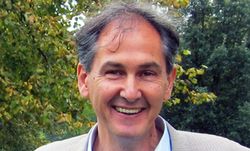From Edge:
 A tiny number of ideas can go a long way, as we've seen. And the Internet makes that more and more likely. What's happening is that we might, in fact, be at a time in our history where we're being domesticated by these great big societal things, such as Facebook and the Internet. We're being domesticated by them, because fewer and fewer and fewer of us have to be innovators to get by. And so, in the cold calculus of evolution by natural selection, at no greater time in history than ever before, copiers are probably doing better than innovators. Because innovation is extraordinarily hard. My worry is that we could be moving in that direction, towards becoming more and more sort of docile copiers.
A tiny number of ideas can go a long way, as we've seen. And the Internet makes that more and more likely. What's happening is that we might, in fact, be at a time in our history where we're being domesticated by these great big societal things, such as Facebook and the Internet. We're being domesticated by them, because fewer and fewer and fewer of us have to be innovators to get by. And so, in the cold calculus of evolution by natural selection, at no greater time in history than ever before, copiers are probably doing better than innovators. Because innovation is extraordinarily hard. My worry is that we could be moving in that direction, towards becoming more and more sort of docile copiers.
[MARK PAGEL:] I'm an evolutionary biologist, and my work draws me to the big events that have shaped the history of the world. Some of these we agree upon, and others are right under our noses, and yet we take them for granted and we may not appreciate what a force they've been in our evolution. One of those is the human capacity for culture. It might easily be the most important event in the history of life.
It might be useful, with such a statement like that, to review some of these big events. Obviously one of the big events in our history was the origin of our planet, about 4.5 billion years ago. And what's fascinating is that about 3.8 billion years ago, only about seven or eight hundred million years after the origin of our planet, life arose. That life was simple replicators, things that could make copies of themselves. And we think that life was a little bit like the bacteria we see on earth today. It would be the ancestors of the bacteria we see on earth today. That life ruled the world for 2 billion years, and then about 1.5 billion years ago, a new kind of life emerged. These were the eukaryotic cells. They were a little bit different kind of cell from bacteria. And actually the kind of cells we are made of. And again, these organisms that were eukaryotes were single-celled, so even 1.5 billion years ago, we still just had single-celled organisms on earth. But it was a new kind of life. It was another 500 million years before we had anything like a multicellular organism, and it was another 500 million years after that before we had anything really very interesting. So, about 500 million years ago, the plants and the animals started to evolve. And I think everybody would agree that this was a major event in the history of the world, because, for the first time, we had complex organisms. After about 500 million years ago, things like the plants evolved, the fish evolved, lizards and snakes, dinosaurs, birds, and eventually mammals. And then it was really just six or seven million years ago, within the mammals, that the lineage that we now call the hominins arose. And they would be direct descendants of us. And then, within that lineage that arose about six or seven million years ago, it was only about 200,000 years ago that humans finally evolved. And so, this is really just 99.99 percent of the way through the history of this planet, humans finally arose. But in that 0.01 percent of life on earth, we've utterly changed the planet. And the reason is that, with the arrival of humans 200,000 years ago, a new kind of evolution was created. The old genetical evolution that had ruled for 3.8 billion years now had a competitor, and that new kind of evolution was ideas.
More here.
The nondescript apartment looks like an average home in Karachi. It’s the bar of Chandrika herbal soap in the bathroom and the Mathrubhoomi calendar on the wall, ubiquitous to Malayali homes, that betrays the lineage of its occupants. The flat’s octogenarian owner, BM Kutty, came to Karachi from Kerala in search of greener pastures in 1949, a time when Karachi was just a train ride away from Mumbai. Since then, the political activist has spent six decades of his life as a Pakistani national.
